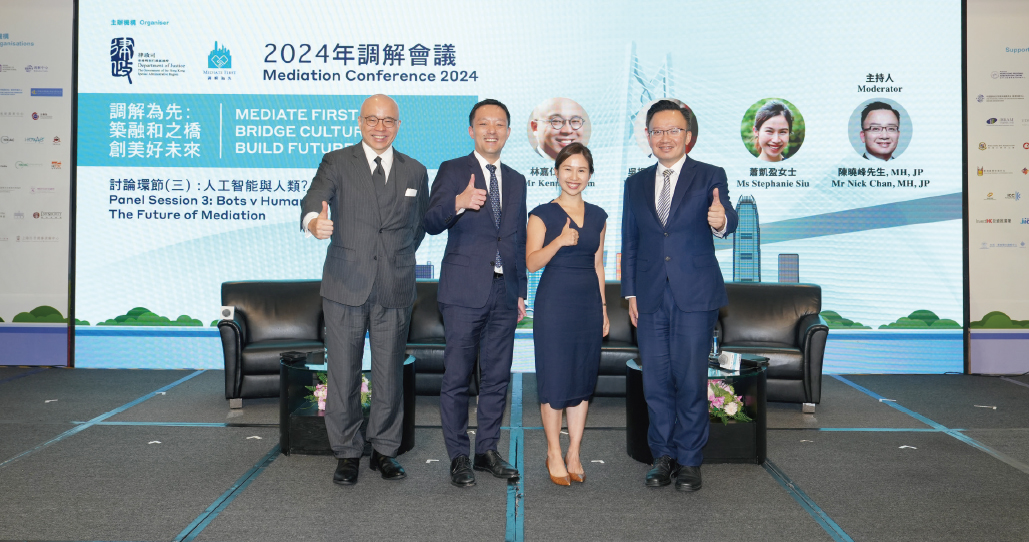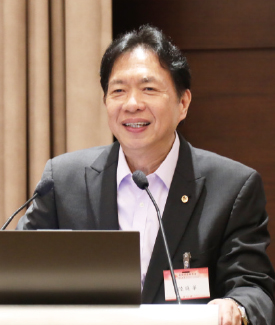

Hong Kong’s Unique Mix of Advantages Makes it the Perfect Choice for an International Mediation Center
A legal technology expert with a background in computer science, Nick Chan, NPC Deputy and Director of Hong Kong Regional Arbitration Center, the Asian-African Legal Consultative Organization (AALCO), points out that in keeping with the spirit advocated by the “Belt and Road” initiative, the business community should actively explore partnership opportunities, seek common ground while respecting differences, and cooperate for a win-win situation for all. “According to APEC statistics, SMEs and MSEs account for 97% of all businesses but their share in direct export is only 35%. Apparently there is a real need for these businesses to tap new markets. The presence of a treaty-based inter-governmental body in Hong Kong ― the International Organization for Mediation ― will help clear concerns among SMEs and MSEs about exploring new markets.”
A positive message that reflects global recognition of “One Country, Two Systems”
“Legal action may not be the best way to resolve cross-border and international commercial disputes. Firstly, it means hefty legal fees for both parties; secondly, it is not always possible to enforce a court order in another jurisdiction even though one party has won the case,” said Chan. Relatively speaking, mediation and arbitration have become increasingly popular in recent years. A mutually agreed settlement can save huge litigation expenses for both parties who may remain on good terms thereafter.
The International Organization for Mediation has chosen Hong Kong as its headquarters. Chan says it fully demonstrates that Hong Kong’s “One Country, Two Systems” principle, legal system and judicial system are highly recognized and trusted by the international community. It also acknowledges Hong Kong’s solid foundation and strength as an Asia Pacific center for international legal and dispute resolution services.
Chan stresses that the global community must have engaged in discussions on the International Organization for Mediation’s decision to establish its headquarters in Hong Kong, so as to identify the most suitable location for resolving disputes and conflicts through mediation. “Hong Kong is blessed with many unique advantages. These include the strong support of our nation’s ‘14th Five-year’ Plan, a solid foundation in the rule of law, a global vision, the only jurisdiction in China that implements common law and a talent powerhouse.”
Arbitration and mediation can help resolve disputes while promoting mutual benefit and win-win results
In fact, the AALCO Hong Kong Regional Arbitration Center was established in Hong Kong under international law in November 2021. As Chan explains, member states reached a consensus to establish a new regional arbitration center in China, and Hong Kong was again strongly supported by the Central Government to give scope to its unique advantages. Hong Kong’s role is to help member states, businesses and the public to prevent, avoid and resolve disputes to facilitate more business deals.
Looking ahead, Chan firmly believes that the “mediation first” concept will take root. However, training and recruitment efforts are required to develop more outstanding mediators. In particular, he encourages business leaders in the latter half of their professional careers to consider acting as mediators to help other SMEs and MSEs to resolve commercial disputes. “I am most confident that International Organization for Mediation will not only help people save unnecessary legal fees in the future, but also build consensus on driving growth and promoting mutual benefit and win-win results.”

Leverage Hong Kong for Greater Mediation Effectiveness in Greater Bay Area
Mediation services in Hong Kong officially began development in the 1990s. As a professional “peacemaker”, Denys Look, Chairman of the Hong Kong Mediation Alliance (HKMEA), said that the demand for local and cross-boundary mediation services has become increasingly strong along with growing awareness and confidence among the public and various industries in mediation services. In recent years, the country has also strongly supported the integration of Hong Kong’s mediation services into the Guangdong-Hong Kong-Macao Greater Bay Area (Greater Bay Area) to provide more support to the market.
Achieving win-win outcome with time-saving and confidential process
HKMEA was established in 2012 as a non-profit organization dedicated to nurturing mediators and raising public awareness of mediation. Look said that mediation is a voluntary participation process and uses a non-confrontational approach to resolve disputes. During the process, a trained and impartial third party, i.e. the mediator, arranges for all parties to meet in a private and confidential environment to present their respective arguments and listen to the other party’s side of the story.
Look stressed that the task of mediators is neither to make decisions for the parties nor to determine what is right and wrong. Rather, they assist the parties in exploring their arguments and viewpoints, and seeking feasible solutions. They also assist the parties in reaching a settlement outcome that meets the needs of and is acceptable to all parties in a calm atmosphere, thereby resolving the dispute and promoting social harmony.
Compared with arbitration and litigation, the mediation process seeks to be faster and to achieve a win-win outcome. It also tries to avoid incurring costs arising from the dispute, including monetary, time, physical, mental, relationship and reputation costs. Hence, the market demand for local and cross-boundary mediation services is on the rise. However, the Greater Bay Area comprises three different legal systems of the Mainland, Hong Kong and Macao. The mediation models, systems and development among the three places are also different.
Platform and unified standards established to help resolve cross-boundary disputes
Look pointed out that the Mainland has taken reference from Hong Kong’s framework and mechanism for mediation services, while the country strongly supports Hong Kong’s integration into the Greater Bay Area. At the second Greater Bay Area Legal Departments Joint Conference held in 2020, the legal departments of Guangdong, Hong Kong and Macao endorsed the working proposal to set up the Greater Bay Area Mediation Platform which serves as an authoritative platform for exchange and cooperation among the three places, discharging the role of a standard-setting body with a view to promoting the wider use of mediation within the Greater Bay Area.
Two mediation standards, namely the Greater Bay Area Mediator Accreditation Standards and the Greater Bay Area Mediator Code of Conduct Best Practice, as well as the Greater Bay Area Cross-boundary Disputes Mediation Model Rules were endorsed and came into effect on 30 December 2021 and 30 December 2022, respectively. These mediation standards and rules, which were formulated and promulgated by the Greater Bay Area Mediation Platform, will advance the building of the rule of law in the Greater Bay Area and help Hong Kong’s integration into the Greater Bay Area’s development. They will also encourage the use of mediation resources by the business sector and the public in the three places to resolve cross-boundary disputes.
In addition, representatives of the legal departments of Guangdong, Hong Kong and Macao set up the Working Group on the Greater Bay Area Mediation Platform in August 2021 to support the operation of the mediation platform, as well as to assist and support the mediation platform in performing its functions. Look added that Hong Kong’s mediation services, which are embarking on a course to break new grounds, will continue to work with the Greater Bay Area cities to create mutually beneficial and win-win solutions with the support of the country.




